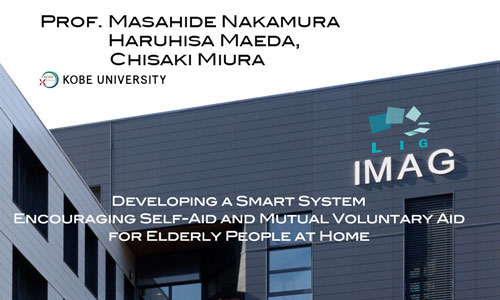Masahide Nakamura, Haruhisa Maeda, Chisaki Miura - Developing a Smart System Encouraging Self-Aid and Mutual Voluntary Aid for Elderly People at Home
- Seminar
- smart system
- virtual agent
- IoT
- in-home long-term care
- self-aid
- mutual-aid

In Japan, the number of elderly people with cognitive impairment isestimated to be over 13 million in 2025. Due to chronical shortage ofcare resources, the government is shifting the policy from theconventional facility care to in-home long-term care. For this, theMinistry of Health, Labor and Welfare has declared to implement thecommunity-based integrated care systems. It supports the in-homelong-term care based on four aids: self-aid, mutual voluntary aid,mutual insurance aid, and public aid. However, it is almost impossibleto extend the mutual insurance aid and the public aid. Hence, the keychallenge lies in the self-aid and the mutual voluntary aid.
The purpose of research is to develop a practical and affordablesystem that supports elderly people at home to work on the self-aidand the mutual voluntary aid. Integrating ICT, IoT, and the virtualagent (VA, an animated chat-bot program with voice interactions)technologies, the proposed system tries to capture externallyobservable events at home, but also to understand "mind" of theperson, including condition, anxiety, intension, and desire. Thesystem then connects the person to information, resources, services,and people, necessary for the self-aid and the mutual voluntary aid.
The proposed system consists of the following three subsystems:
(S0) In-Home Care Service Platform: Using the IoT, the platformmonitors the status of the elderly person based on the environment andactivity sensing. Moreover, the platform conducts mind sensing, whichexternalizes the internal states of the elderly by words throughconversation with VA. Based on the sensing data, the platformconstructs a digital twin of the elderly person on the system.
(S1) Self-Aid Support Service: It provides applications that encouragethe person to solve various problems by his/her own effort. Throughthe digital twin, the service understands the current status andsurrounding contexts in real-time. Depending on the situation, theservice actively connects the person to necessary resources,information, services, and professionals.
(S2) Mutual-Aid Support Service: It provides applications that createan opportunity of networking with peers. Using the information of thedigital twins, the service matches elderly people in similarcircumstances. The VA conveys the communication among the matchedpeople. If a relationship of trust is established, the elderly peopledirectly communicate with each other via a chat app or a video call.This creates the mutual voluntary network.
We are currently developing the system. In this seminar, we presentour latest technologies for (S0), including the activity recognitionwith environment sensing and the rule-based mind sensing service.




